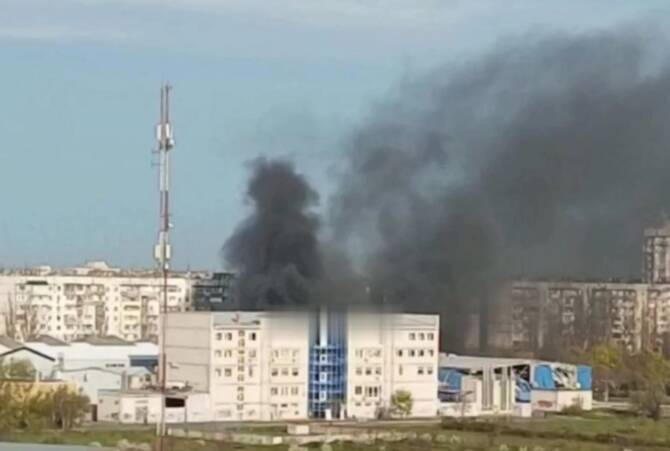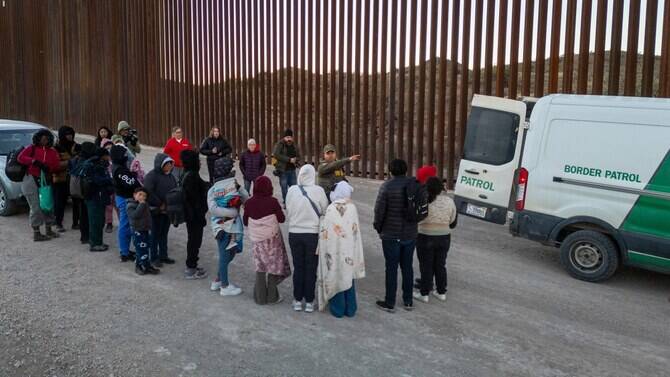KYIV: Russian glide bombs and artillery struck a city in southern Ukraine on Wednesday, killing one person and wounding nine others as Moscow forces continued daily attacks across the country.
The city of Kherson was struck with glide bombs on Wednesday morning, and when rescue teams arrived at the scene, Russian forces launched an artillery barrage, said the region’s head, Oleksandr Prokudin. “This is a deliberate tactic by Russia to hinder the rescue of the injured and harm doctors, rescuers, and police,” he said.
The attack damaged a sports facility, a supermarket, residential buildings and civilian vehicles, Prokudin added.
The strike on Kherson followed other deadly attacks in recent days. On Palm Sunday, two Russian ballistic missile hit the northeastern city of Sumy near the Russian border, killing 35 people and injuring more than 100 others in the deadliest attack on Ukrainian civilians this year. The Russian military said that the strike targeted a gathering of senior military officers, but did not offer evidence.
In Sumy on Wednesday, mourners buried 11-year old Maksym Martynenko — one of two children killed in the attack — and his parents Nataliia and Mykola. Their three caskets were open for final farewells at a church in the city center before the bodies were taken to the family’s village for burial in the same plot.
“I can’t believe that one family, just like that, one day … just went away, just like that,” said Daria Doroshenko, Maksym’s school teacher.
Pastor Artem Tovmasian, a friend of the family, said at the service that their deaths were a tragedy that “should be condemned in a real way.” He said the international community’s reaction should not be just “words of condolence,” but action.
The attack on Sumy and other areas came even as Moscow and Kyiv both agreed last month to implement a 30-day halt on strikes on energy facilities. Both parties have differed on the start time for stopping strikes and alleged daily breaches by the other side.
The Russian military said it downed 26 Ukrainian drones over several Russian regions early Wednesday.
Asked Wednesday if Russia is going to stop abiding by the limited ceasefire after 30 days, Kremlin spokesman Dmitry Peskov demurred, saying the decision will be made later.
Moscow has effectively refused to accept a comprehensive ceasefire that President Donald Trump has sought and Ukraine has endorsed. Russian President Vladimir Putin has made it conditional on a halt in Ukraine’s mobilization efforts and Western arms supplies, the demands rejected by Ukraine. Kyiv believes Moscow’s forces are gearing up for a fresh offensive.
Russian forces hold the battlefield advantage in Ukraine, pressing attacks in several sectors of the 1,000-kilometer (over 600-mile) frontline, and Kyiv has warned Moscow is planning a new offensive to improve its negotiating position.
US Secretary of State Marco Rubio and Trump’s special envoy Steve Witkoff will travel to Paris on Thursday for “talks with European counterparts to advance President Trump’s goal to end the Russia-Ukraine war and stop the bloodshed.”
Rubio will also “discuss ways to advance shared interests in the region,” State Department spokesperson Tammy Bruce said in a statement.
Wikoff, who visited Russia on Friday for his third meeting with Putin that lasted nearly five hours, told Fox News earlier this week that the Russian leader wants a “permanent peace,” noting that a prospective peace deal would focus on Russian claims for five Ukrainian regions.
Ukraine’s President Volodymyr Zelensky criticized Witkoff’s comment, emphasizing that Ukraine will never recognize any temporarily occupied territories as Russian.
Commenting on ongoing negotiations with the US over a prospective agreement that would give the US access to Ukraine’s valuable mineral resources, Ukraine’s Economy Minister Yuliia Svyrydenko said the US and Ukrainian teams have achieved “significant progress.”
She said that both sides are working on a “memorandum of intent” that would reflect positive developments in the talks, adding that “we are preparing to complete the formalization of the agreement in the near future.”
The deal, which needs to be ratified by the Ukrainian parliament, “will provide opportunities for investment and development in Ukraine, and will also provide conditions for tangible economic growth for both Ukraine and the United States,” Svyrydenko said.
In Russia, the authorities on Wednesday arrested Alexei Smirnov, former governor of the Kursk region on the border with Ukraine, where Kyiv’s forces still hold onto a patch of land after a surprise incursion in August 2024.
Smirnov, who served as the Kursk governor in May-December 2024, his former deputy, three other officials and contractors in the region have been accused of fraud and embezzling the money allocated for building fortifications on the border with Ukraine.
If convicted, Smirnov is facing up to 10 years in prison.
Kyiv’s forces pushed into Kursk on Aug. 6, 2024, in a surprise attack, overwhelming lightly armed Russian border guards and a few infantry units. Russian forces have since driven Ukrainian troops out of Sudzha, the biggest town they have held since the incursion, and some of the other areas, but Kyiv’s forces still hold onto a patch of land there.

























